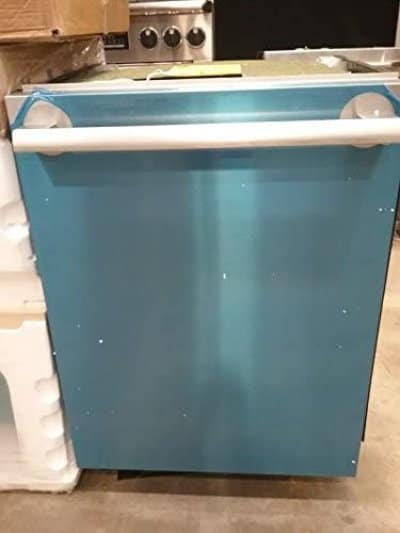Disposing of an old dishwasher requires careful consideration and planning to ensure that the process is environmentally friendly and complies with local regulations.
As a household appliance, dishwashers contain materials that can be harmful to the environment if not handled properly.
In this comprehensive guide, we will provide detailed steps and considerations for disposing of your old dishwasher effectively.

Table of Contents
How to Dispose of Old Dishwasher?
There are a few options for disposing of an old dishwasher. One common method is to contact your local waste management or recycling center to inquire about their appliance disposal services.
Many centers offer pick-up services for large appliances like dishwashers, which can then be recycled or properly disposed of.
Another option is to check with the retailer where you purchased your new dishwasher, as some stores may offer a trade-in program or take back old appliances for recycling.
Additionally, you can consider selling or donating the old dishwasher if it is still in working condition.
Websites like Craigslist or local Facebook groups can be good platforms to find someone who may be interested in taking it off your hands.
1. Evaluate the Condition of Your Dishwasher
Before disposing of your dishwasher, it’s important to evaluate its condition. This step will help determine the most appropriate method of disposal.
Assessing Usability
If your dishwasher is still functional, consider the following options:
- Donation: Many charitable organizations accept working appliances.
- Selling: Platforms like Craigslist, Facebook Marketplace, or local classifieds can be used to sell your appliance.
Beyond Repair
If your dishwasher is beyond repair, it’s crucial to follow proper disposal methods to minimize environmental impact.

2. Check Local Regulations and Recycling Programs
Different regions have varying regulations for disposing of large appliances. Check with your local waste management authorities or visit their website to understand the guidelines specific to your area.
Recycling Programs
Many municipalities offer recycling programs for large appliances. These programs ensure that materials like metal, plastic, and electronic components are properly recycled.
Hazardous Material Handling
Dishwashers contain components that may be considered hazardous. Ensure that you follow guidelines for handling these materials to avoid fines and environmental harm.
3. Prepare Your Dishwasher for Disposal
Proper preparation is essential before disposing of your old dishwasher. This step ensures safety and compliance with recycling or disposal programs.
Disconnecting the Dishwasher
- Turn off the power: Ensure the dishwasher is disconnected from the electrical supply.
- Turn off the water supply: Shut off the water valve connected to the dishwasher.
- Detach hoses: Carefully remove the water supply and drainage hoses.
Cleaning
Clean the dishwasher thoroughly to remove any food particles or residue. This step is particularly important if you are donating or selling the appliance.

4. Disposal Options
Depending on the condition and regulations in your area, there are several disposal options available.
Recycling Centers
Many recycling centers accept large appliances. Check with local centers to see if they accept dishwashers and if there are any fees involved.
Manufacturer Take-Back Programs
Some manufacturers offer take-back programs where they recycle old appliances. Contact the manufacturer of your dishwasher to see if this option is available.
Retailer Haul-Away Services
When purchasing a new dishwasher, many retailers offer haul-away services for your old appliance. This service is often included in the delivery fee of the new dishwasher.
Municipal Waste Services
Check with your local waste management services to see if they offer bulk pick-up services for large appliances. This option may require scheduling in advance.
5. Environmental Considerations
Proper disposal of your dishwasher is not just about convenience but also about protecting the environment.
Avoid Landfills
Avoid disposing of your dishwasher in a landfill, as this can lead to harmful materials seeping into the soil and water supply.
Recycling Benefits
Recycling helps recover valuable materials and reduces the need for new raw materials, conserving natural resources and reducing environmental impact.
Energy Conservation
Recycling appliances saves energy by reducing the energy needed to produce new materials. It also helps reduce greenhouse gas emissions.
6. Donating Your Dishwasher
If your dishwasher is still in working condition, consider donating it to a charitable organization.
Finding Organizations
Many non-profits, such as Habitat for Humanity and Goodwill, accept large appliances. Contact these organizations to see if they will accept your donation.
Tax Deductions
Donating your appliance can also provide a tax deduction. Ensure you get a receipt for your donation to claim this benefit on your taxes.
7. Selling Your Dishwasher
If your dishwasher is still in good working condition, selling it is another viable option.
Online Platforms
Use online platforms like Craigslist, eBay, or Facebook Marketplace to list your dishwasher. Be sure to include detailed descriptions and photos.
Local Classifieds
Local newspapers and bulletin boards are also good places to advertise your dishwasher for sale.
8. Creative Reuse and Upcycling
For those who are environmentally conscious and creative, consider repurposing parts of your old dishwasher.
DIY Projects
Old dishwashers can be upcycled into various useful items, such as storage units, planters, or even furniture.
Component Reuse
Components like racks, hoses, and motors can be reused for other DIY projects or repairs.
Conclusion
Disposing of an old dishwasher requires careful consideration and planning to ensure that the process is environmentally friendly and compliant with local regulations.
Whether you choose to donate, sell, recycle, or creatively reuse your old appliance, taking the right steps will help minimize the environmental impact and provide potential benefits for you and your community.
